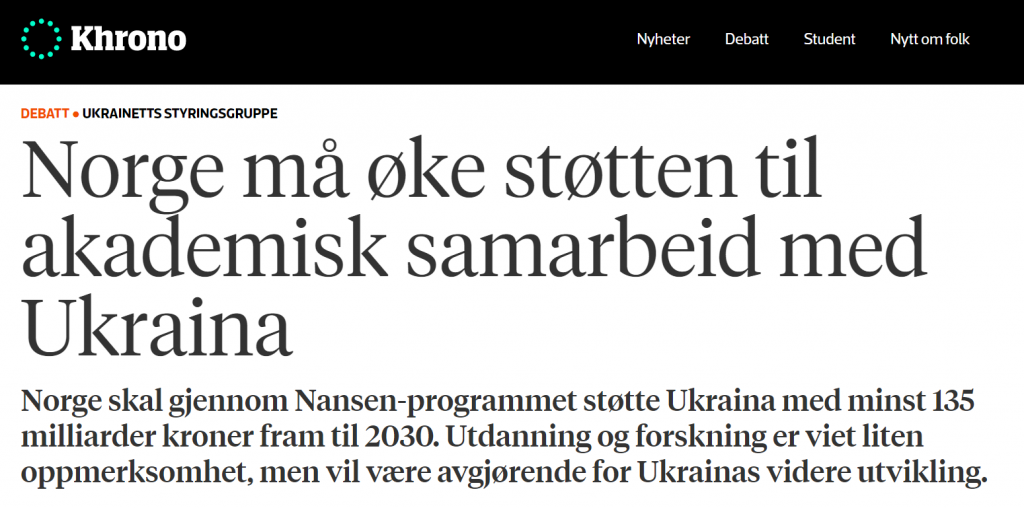UKRAINETT’s Steering Group has written an op-ed for the Norwegian Online Newspaper Khrono. Link to the op-ed here. Below you find an unauthorised translation of the op-ed into English.

Norway must increase support for academic collaboration with Ukraine
Through the Nansen program, Norway will support Ukraine with at least NOK 135 billion by 2030. Education and research have received little attention, but will be crucial for Ukraine’s future development.
There is currently a debate about whether Norway’s support for Ukraine is sufficient. The immediate need for military aid is obvious and must naturally be the highest priority. In parallel with military aid, Norway has also prioritized civil assistance to support the Ukrainian population, addressing both urgent humanitarian needs and the long-term reconstruction of the country. The civil aid aims to ensure that Ukraine stands strong even after the war is over.
In our view, support for the Ukrainian education and research sector should be an integrated part of this civil aid. Ukraine will need highly educated workers during the crucial reconstruction phase, while the war has severely affected Ukrainian universities and research institutions. Many of the country’s best researchers have fled, and the country risks further brain drain among both students and university staff if opportunities for academic development and research continue to deteriorate.
Norway is in a favorable position to promote university and research collaboration that can help strengthen Ukrainian universities and research institutions. Through previous cooperation programs, such as the Eurasia Program in HK-dir and the NORRUSS Plus research program in the Research Council of Norway, solid collaborative relationships were established between Ukrainian and Norwegian research and educational communities.
Today, when the need is greatest, such programs have been discontinued, and we have received no indications that new ones will be established. As a result, there is a risk that Norwegian academic communities with expertise on Ukraine will have to shift focus to other research areas, leading to the gradual erosion of this expertise.
By restoring or expanding such programs, Norway could not only continue the strong partnerships already established but also position itself as a key player in strengthening Ukraine’s academic sector. There has been significant engagement for Ukraine at Norwegian universities. Therefore, there is good reason to believe that Norwegian higher education institutions have the capacity to manage funds for cooperation with Ukraine effectively.
Through active collaboration with Ukrainian research communities, Norwegian researchers will not only be able to support their Ukrainian colleagues but also contribute to the knowledge-building about Ukraine that Norwegian authorities need to ensure that long-term aid to Ukraine is as effective as possible.
The situation is not entirely bleak. After the full-scale Russian invasion, a Norwegian network for Ukraine research, UKRAINETT, was established, which now approaches 100 members. The network has received a three-year grant from the Research Council of Norway, aimed at strengthening partnerships between Norwegian and Ukrainian educational and research institutions. The network organizes joint seminars and annual conferences, as well as a range of other dissemination activities aimed at different audiences in both Norway and Ukraine. There is also a seed funding scheme for project development.
The network’s partner institutions in Ukraine are universities and research institutions that have had or currently have collaboration with Norwegian researchers. We, the members of the steering group for the network, are calling for the opportunity to fund joint research projects and more ambitious education programs.
We also believe that Norwegian universities and colleges, in solidarity with our Ukrainian colleagues, should be more proactive in supporting Ukrainian educational institutions. Establishing scholarship schemes, allowing digital participation in educational programs, exchange agreements, material support, and friendship agreements can be important measures. Some Norwegian universities have already made great efforts, but most can do more.
It is crucial that such cooperation develops into more than fine speeches and declarations of solidarity and that it results in concrete actions that benefit our Ukrainian colleagues while also helping to limit further brain drain. We challenge the Norwegian Association of Higher Education Institutions to take the initiative in stepping up this effort, and we at UKRAINETT, together with our Ukrainian partner institutions, are ready to contribute to such a strengthened effort.
By investing in educational and research cooperation, Norway can also help strengthen an independent Ukraine that is better prepared for the future.
Members of the UKRAINETT Steering Group:
Geir Flikke, ILOS, University of Oslo
Anne Gry Gudmundsdotter, University of South-Eastern Norway
Olga Iermolenko, Business School, Nord University
Gaiane Nuridzhanian, UiT The Arctic University of Norway
Martin Paulsen, University of Bergen
Anne Pintsch, University of Agder
Tom Røseth, Norwegian Defence University College
Nataliya Yeremeyeva, The European Wergeland Centre
Aadne Aasland, NIBR, OsloMet (Leader of UKRAINETT)
Kristian Åtland, Norwegian Defence Research Establishment (FFI)
